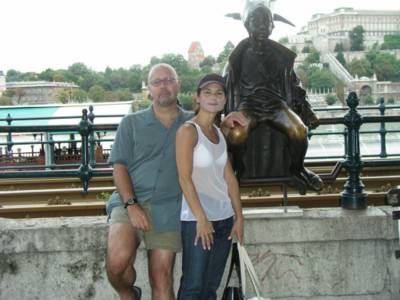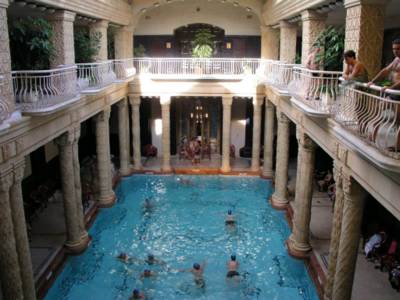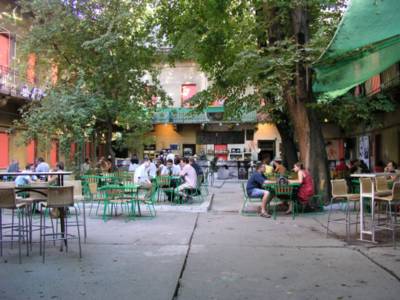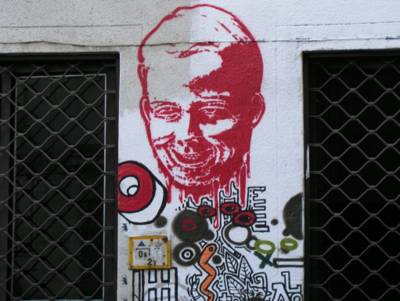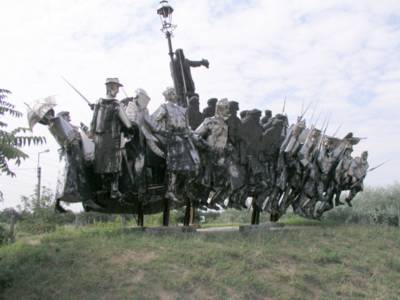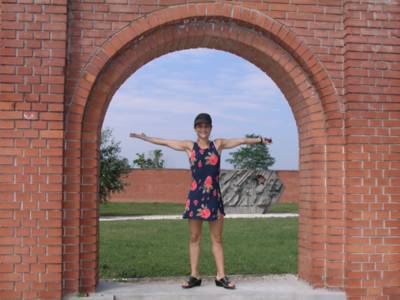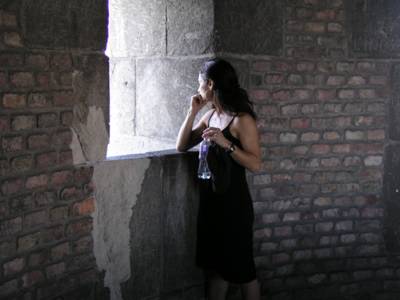
"Why Can't I Be Different and Original . . . Like Everybody Else?" - Viv Stanshall
Tuesday, August 31, 2004
I'm So Proud
(In a sarcastic voice): "I'm so proud."
Our President, after saying that we can win the war on terrorism, admited earlier this week that the war can't in fact be won, only to later retract that statement and say that it can be won after all.
And he calls his opponent a "flip flopper."
Of course, he was correct at least once. The war will never be won - in fact, waging war is one of the leading causes of terrorism. And look how well the War on Drugs is doing. And the War on Poverty (one million new Americans below the poverty level this year) . . .
Here in Atlanta, our ex-Mayor has been indicted on charges of corruption, bribery, fraud, obstruction of justice and illegal campaign contributions.
Georgia finished second-to-last nationwide in SAT scores according to results released today by the College Board. The only state less educated than Georgia was our neighbor, South Carolina. Georgia's average score was 987 out of a possible 1600, only slightly better than last year's 984. Georgia students averaged 494 out of 800 on the verbal portion and a 493 on the math. The national average score was 1026 (508 verbal and 518 math).
Of course, our local newspaper, the Constitution-Journal, tried to put a positive spin on it, and headlined the story "Georgia SAT Score Climbs 3 Points."
And as if to show just what the consequences of lack of education can lead to, a young man (let's call him "Dumb") leaned his head out of the passenger side of his friend's pickup truck to puke after a night of heavy drinking at Runaround Sue's, a bar in Marietta, and was decapitated when he struck the support wire of a telephone pole. And as if that weren't bad enough, the friend (let's call him "Dumber") then drove 12 miles to his house with the body still hanging out the passenger window, and went to sleep in blood-soaked clothes, leaving his pickup truck parked overnight in the driveway. A neighbor walking with his daughter Sunday morning saw the body and called the police, who later found the severed head at the accident site on Canton Road.
And this just after the press coverage was winding down about the funeral home operator in northwest Georgia who dumped and buried dozens of bodies in his backyard after charging the families for cremations he never performed.
Let's scan a few more of today's headlines, shall we?:
"House Bulldozed by Mistake"
"Rep. Collins Injured in Farm Accident, Cancels Plans to Attend GOP Convention"
Starting to see a pattern here?
I'm so proud . . . I put new tires on my Jeep today.
Our President, after saying that we can win the war on terrorism, admited earlier this week that the war can't in fact be won, only to later retract that statement and say that it can be won after all.
And he calls his opponent a "flip flopper."
Of course, he was correct at least once. The war will never be won - in fact, waging war is one of the leading causes of terrorism. And look how well the War on Drugs is doing. And the War on Poverty (one million new Americans below the poverty level this year) . . .
Here in Atlanta, our ex-Mayor has been indicted on charges of corruption, bribery, fraud, obstruction of justice and illegal campaign contributions.
Georgia finished second-to-last nationwide in SAT scores according to results released today by the College Board. The only state less educated than Georgia was our neighbor, South Carolina. Georgia's average score was 987 out of a possible 1600, only slightly better than last year's 984. Georgia students averaged 494 out of 800 on the verbal portion and a 493 on the math. The national average score was 1026 (508 verbal and 518 math).
Of course, our local newspaper, the Constitution-Journal, tried to put a positive spin on it, and headlined the story "Georgia SAT Score Climbs 3 Points."
And as if to show just what the consequences of lack of education can lead to, a young man (let's call him "Dumb") leaned his head out of the passenger side of his friend's pickup truck to puke after a night of heavy drinking at Runaround Sue's, a bar in Marietta, and was decapitated when he struck the support wire of a telephone pole. And as if that weren't bad enough, the friend (let's call him "Dumber") then drove 12 miles to his house with the body still hanging out the passenger window, and went to sleep in blood-soaked clothes, leaving his pickup truck parked overnight in the driveway. A neighbor walking with his daughter Sunday morning saw the body and called the police, who later found the severed head at the accident site on Canton Road.
And this just after the press coverage was winding down about the funeral home operator in northwest Georgia who dumped and buried dozens of bodies in his backyard after charging the families for cremations he never performed.
Let's scan a few more of today's headlines, shall we?:
"House Bulldozed by Mistake"
"Rep. Collins Injured in Farm Accident, Cancels Plans to Attend GOP Convention"
Starting to see a pattern here?
I'm so proud . . . I put new tires on my Jeep today.
Monday, August 30, 2004
One Thing
In an evening talk, Dogen said:
"Even people in the secular world must concentrate on one thing and learn it thoroughly enough to be able to do it in front of others rather than learn many things at the same time, without truly accomplishing any of them.
"This holds all the more true for the buddha-dharma, which transcends the secular world, and has never been learned or practiced from the beginningless beginning. We are still unfamiliar with it. Also, our capacity is poor. If we try to learn many things about this lofty and boundless buddha-dharma, we will not attain even one thing. Even if we devote ourselves to only one thing, because of our inferior capacity and nature, it will be difficult to clarify buddha-dharma thoroughly in one lifetime. Students, concentrate on one thing."
Ejo asked, "If so, what thing or what practice should we choose to devote ourselves to among the various ways of practice of the buddha-dharma?"
Dogen replied, "It depends upon one's character or capability, however, up to now, it is zazen which has been handed down and concentrated on in the communities of the patriarchs. This practice is suitable for all people and can be practiced by those of superior, mediocre, or inferior capabilities. When I was in China, in the assembly of my late master Tendo Nyojo, I sat zazen day and night after I heard this truth. When it was extremely hot or cold, monks there stopped sitting for a while because they were afraid of getting sick. At the time, I thought to myself, 'I may become sick and die. Still, I should just practice zazen. What is the use of clinging to this body? How can I refrain from practice when I am not sick? Dying from illness because of practice accords with my original wish. First of all, I am fortunate to be able to practice and die in an assembly under a good teacher in great China, and to be buried by such great people with an authentic Buddhist funeral. If I were in Japan, it would be impossible to have a funeral service performed by such people according to the Buddhist rituals. If I were to die during practice before clarifying enlightenment, I would be born into the family of Buddha again because of having established the relationship. It is meaningless to live long without practicing. It is useless. Furthermore, even if I wished to keep my body secure and healthy, I might drown in the ocean or meet an accidental death; how regrettable it would be!'
"With such resolve, I continually sat upright day and night. Yet I never once got sick. Now, each of you should practice exclusively and wholeheartedly. Ten out of ten of you will attain the Way. My late master Tendo encouraged us in this way."
"Even people in the secular world must concentrate on one thing and learn it thoroughly enough to be able to do it in front of others rather than learn many things at the same time, without truly accomplishing any of them.
"This holds all the more true for the buddha-dharma, which transcends the secular world, and has never been learned or practiced from the beginningless beginning. We are still unfamiliar with it. Also, our capacity is poor. If we try to learn many things about this lofty and boundless buddha-dharma, we will not attain even one thing. Even if we devote ourselves to only one thing, because of our inferior capacity and nature, it will be difficult to clarify buddha-dharma thoroughly in one lifetime. Students, concentrate on one thing."
Ejo asked, "If so, what thing or what practice should we choose to devote ourselves to among the various ways of practice of the buddha-dharma?"
Dogen replied, "It depends upon one's character or capability, however, up to now, it is zazen which has been handed down and concentrated on in the communities of the patriarchs. This practice is suitable for all people and can be practiced by those of superior, mediocre, or inferior capabilities. When I was in China, in the assembly of my late master Tendo Nyojo, I sat zazen day and night after I heard this truth. When it was extremely hot or cold, monks there stopped sitting for a while because they were afraid of getting sick. At the time, I thought to myself, 'I may become sick and die. Still, I should just practice zazen. What is the use of clinging to this body? How can I refrain from practice when I am not sick? Dying from illness because of practice accords with my original wish. First of all, I am fortunate to be able to practice and die in an assembly under a good teacher in great China, and to be buried by such great people with an authentic Buddhist funeral. If I were in Japan, it would be impossible to have a funeral service performed by such people according to the Buddhist rituals. If I were to die during practice before clarifying enlightenment, I would be born into the family of Buddha again because of having established the relationship. It is meaningless to live long without practicing. It is useless. Furthermore, even if I wished to keep my body secure and healthy, I might drown in the ocean or meet an accidental death; how regrettable it would be!'
"With such resolve, I continually sat upright day and night. Yet I never once got sick. Now, each of you should practice exclusively and wholeheartedly. Ten out of ten of you will attain the Way. My late master Tendo encouraged us in this way."
Sunday, August 29, 2004
Uptown Sunday
The word on the news this morning was that the protests against the Republican National Convention were to pick up in size and intensity downtown. Wisely, L. and I had scheduled all of our downtown activities for Saturday, and were planning an uptown day for Sunday.
So Sunday morning was spent in the lap of luxury at the Waldorf - Starbucks coffee, room service and the Sunday Times. At checkout time, we reluctantly left our bags with the bellhop and headed in an uptown direction. The Waldorf was heavily guarded by at least a dozen policemen and private security (plus, I imagine, other precautions not quite as apparent to the eye). We walked uptown to Barney's to buy me some more comfortable clothes (like a bonehead, I forgot that it could actually get hot in NYC in August, and I had packed only wool or blend pants, and mostly long-sleeved, but all cool-weather, shirts). One pair of Hugo Boss jeans, Three Dot sweatpants and a long-sleeve t-shirt later, we headed to a strangely uncrowded Metropolitan Museum of Art to see the Dangerous Liaisons show of 18th Century French (the theme still continues) furniture and clothing. After the Met, we had lunch at the usually-mobbed-but-today-nearly-empty E.A.T. (Madison and 80th), then a little clothes shopping for L., and then back to the Waldorf to pick up our bags and take a cab back to LaGuardia for our flight home.
Meanwhile, a roaring two-mile river of demonstrators was surging through downtown Manhattan in the city's largest political protest in decades, a raucous but peaceful spectacle that pilloried George W. Bush and demanded regime change in Washington. According to Robert McFadden in the New York Times, "On a sweltering August Sunday, the huge throng of protesters marched past Madison Square Garden . . . and denounced President Bush as a misfit who had plunged America into war and runaway debt, undermined civil and constitutional rights, lied to the people, despoiled the environment and used the presidency to benefit corporations and millionaires. The protest organizer, United for Peace and Justice, estimated the crowd at 500,000, rivaling a 1982 antinuclear rally in Central Park, and double the number it had predicted."
"Four more years," Republican delegates reportedly chanted.
"Four more months," the protesters responded.
So why had L. and I avoided all this? I am certainly opposed to the war in Iraq, but I wonder if I'm getting so bourgeois, or so apolitical, that I prefer to spend a Sunday in the Waldorf Astoria, and uptown bastions like the Met and E.A.T., rather than take my political views to the street and stand up for what I believed.
Or am I too ambivalent about politics to get involved? Or is it just that my vacation time and dollars are hard-earned and precious, and not to be spent in a sweaty, angry mob?
Or am I just getting too old? . . .
So Sunday morning was spent in the lap of luxury at the Waldorf - Starbucks coffee, room service and the Sunday Times. At checkout time, we reluctantly left our bags with the bellhop and headed in an uptown direction. The Waldorf was heavily guarded by at least a dozen policemen and private security (plus, I imagine, other precautions not quite as apparent to the eye). We walked uptown to Barney's to buy me some more comfortable clothes (like a bonehead, I forgot that it could actually get hot in NYC in August, and I had packed only wool or blend pants, and mostly long-sleeved, but all cool-weather, shirts). One pair of Hugo Boss jeans, Three Dot sweatpants and a long-sleeve t-shirt later, we headed to a strangely uncrowded Metropolitan Museum of Art to see the Dangerous Liaisons show of 18th Century French (the theme still continues) furniture and clothing. After the Met, we had lunch at the usually-mobbed-but-today-nearly-empty E.A.T. (Madison and 80th), then a little clothes shopping for L., and then back to the Waldorf to pick up our bags and take a cab back to LaGuardia for our flight home.
Meanwhile, a roaring two-mile river of demonstrators was surging through downtown Manhattan in the city's largest political protest in decades, a raucous but peaceful spectacle that pilloried George W. Bush and demanded regime change in Washington. According to Robert McFadden in the New York Times, "On a sweltering August Sunday, the huge throng of protesters marched past Madison Square Garden . . . and denounced President Bush as a misfit who had plunged America into war and runaway debt, undermined civil and constitutional rights, lied to the people, despoiled the environment and used the presidency to benefit corporations and millionaires. The protest organizer, United for Peace and Justice, estimated the crowd at 500,000, rivaling a 1982 antinuclear rally in Central Park, and double the number it had predicted."
"Four more years," Republican delegates reportedly chanted.
"Four more months," the protesters responded.
So why had L. and I avoided all this? I am certainly opposed to the war in Iraq, but I wonder if I'm getting so bourgeois, or so apolitical, that I prefer to spend a Sunday in the Waldorf Astoria, and uptown bastions like the Met and E.A.T., rather than take my political views to the street and stand up for what I believed.
Or am I too ambivalent about politics to get involved? Or is it just that my vacation time and dollars are hard-earned and precious, and not to be spent in a sweaty, angry mob?
Or am I just getting too old? . . .
Saturday, August 28, 2004
New York, New York
On Saturday morning, L. and I began our assault proper on the great metropolis: New York City. From our base in beautiful and scenic Westport, we first drove south to Greenwich, Connecticut to have brunch - quiche and cappuccino - at a little patisserie ("you don't get quiche at a patisserie . . .") with C. and her boyfriend, two friends of L's. For reasons that I still don't quite understand, C. was moving to Africa and not likely to return any time soon, but it was very nice meeting her and I'm sure L. appreciated the time with her old friend, and the quiche was certainly nothing to complain about, either.
After brunch, L. and I backtracked a little and dropped the rental car off in Stamford and took the train into Grand Central Station for our final assault on NYC.
An important note here: if you came across this page because you Googled the words "assault" and "New York City," and you just so happen to be some sort of Homeland Security, Patriot Act or other law enforcement official, please be reassured that I only use the term "launch an assault" as an ironic play of words. Absolutely no threat is being implied here. You may go on with your search.
Anyway, we arrived at Grand Central and took a cab to the Waldorf Astoria, where L. had managed to secure us a room through hotels.com. From the Waldorf, we hailed a cab for SoHo to see the play "Le Comedie du Bicyclette" by The Bicycle Men, part of the NY Fringe Festival. Cab progress was agonizingly slow, however, due to all of the traffic created in lower Manhattan by the protesters. Still and all, we made the play just in time.
The Bicycle Men is a comedy group that uses original songs and humor to tell engaging (if slightly surreal) stories. "Le Comedie du Bicyclette" is the story of an American whose bike breaks down in a French village, where he encounters rude repairmen, disturbing puppets, tourists from Holland and Texas, unsettling cabaret performers, and the god of bicycles. The inside joke in the first paragraph of this post ("you don't get quiche at a patisserie . . .") is based on a recurring gag in the play. L. and I both enjoyed the show immensely.
Keeping our French theme going, after the play, we walked a few blocks crosstown and had steak au poivre at Balthaszar ("I am a great eater of beef, and I believe that does harm to my wit." — Twelfth Night). And after dinner, we walked a few more block to the East Village, where we saw the controversial new movie, "The Brown Bunny." In her review, Manohla Dargis of the New York Times wrote, "Remove self-love from love, wrote the 18th-century French aphorist and revolutionary Chamfort," - see how the French theme continues? - "and not much would be left. Remove self-love and self-serving outrage from the already notorious 'The Brown Bunny,' a minor scandal of a movie that opens today in New York and Los Angeles, and not much would be left, either. Which isn't to say that this artful road movie from the director, narcissist nonpareil and most excellent huckster Vincent Gallo should be avoided, especially if you like your art-house exercises tarted up with some good old-fashioned, hotel-room smut."
After our art-house exercise, it was off in a cab and back up to the Waldorf with the early edition of the Sunday NY Times tucked under my arm.
After brunch, L. and I backtracked a little and dropped the rental car off in Stamford and took the train into Grand Central Station for our final assault on NYC.
An important note here: if you came across this page because you Googled the words "assault" and "New York City," and you just so happen to be some sort of Homeland Security, Patriot Act or other law enforcement official, please be reassured that I only use the term "launch an assault" as an ironic play of words. Absolutely no threat is being implied here. You may go on with your search.
Anyway, we arrived at Grand Central and took a cab to the Waldorf Astoria, where L. had managed to secure us a room through hotels.com. From the Waldorf, we hailed a cab for SoHo to see the play "Le Comedie du Bicyclette" by The Bicycle Men, part of the NY Fringe Festival. Cab progress was agonizingly slow, however, due to all of the traffic created in lower Manhattan by the protesters. Still and all, we made the play just in time.
The Bicycle Men is a comedy group that uses original songs and humor to tell engaging (if slightly surreal) stories. "Le Comedie du Bicyclette" is the story of an American whose bike breaks down in a French village, where he encounters rude repairmen, disturbing puppets, tourists from Holland and Texas, unsettling cabaret performers, and the god of bicycles. The inside joke in the first paragraph of this post ("you don't get quiche at a patisserie . . .") is based on a recurring gag in the play. L. and I both enjoyed the show immensely.
Keeping our French theme going, after the play, we walked a few blocks crosstown and had steak au poivre at Balthaszar ("I am a great eater of beef, and I believe that does harm to my wit." — Twelfth Night). And after dinner, we walked a few more block to the East Village, where we saw the controversial new movie, "The Brown Bunny." In her review, Manohla Dargis of the New York Times wrote, "Remove self-love from love, wrote the 18th-century French aphorist and revolutionary Chamfort," - see how the French theme continues? - "and not much would be left. Remove self-love and self-serving outrage from the already notorious 'The Brown Bunny,' a minor scandal of a movie that opens today in New York and Los Angeles, and not much would be left, either. Which isn't to say that this artful road movie from the director, narcissist nonpareil and most excellent huckster Vincent Gallo should be avoided, especially if you like your art-house exercises tarted up with some good old-fashioned, hotel-room smut."
After our art-house exercise, it was off in a cab and back up to the Waldorf with the early edition of the Sunday NY Times tucked under my arm.
Friday, August 27, 2004
A View of the Sound
After three days of doing relatively little other than office- and house-work, on Friday evening, I flew up to New York City with my former ex-girlfriend L. Despite our mutual desire to avoid anything related to the Republican National Convention or the demonstrations regarding same, we flew to LaGuardia after work on Friday evening, picked up a rental car and drove to Westport, Connecticut as a base from which to launch our assault.
Westport is a quaint little New England beach town on the Long Island Sound. L. owns a house there (which she rents out but we never got to see), and was able to get us a room at the lodge of a local country club. Of course, by the time we arrived at the airport, picked up our rental, and drove to Westport it was almost 11:00 p.m. and way past the time to experience any of the town, other than the tail end of a wedding party at the country club. Our room was at the end of the hallway after a three-floor walkup, but it had a great view of the Sound.
Westport is a quaint little New England beach town on the Long Island Sound. L. owns a house there (which she rents out but we never got to see), and was able to get us a room at the lodge of a local country club. Of course, by the time we arrived at the airport, picked up our rental, and drove to Westport it was almost 11:00 p.m. and way past the time to experience any of the town, other than the tail end of a wedding party at the country club. Our room was at the end of the hallway after a three-floor walkup, but it had a great view of the Sound.
Thursday, August 26, 2004
Fall 2004 Hiking Trip
“Mountain Zazen”
Saturday 25 September 2004, 8 am – 6 pm
with the Chattanooga Sangha
“Mountain Zazen”
Saturday 25 September 2004, 8 am – 6 pm
with the Chattanooga Sangha
The Atlanta Zen Center, in conjunction with the Chattanooga Zen Group, offers a day of nature hiking and outdoor Zen meditation. During the hike, we will explore the forests and streams of the Cohutta wilderness, receiving the gifts of nature’s bounty and offering our own wakefulness to the experience. We invite you to participate in this unique nature experience and chance to experience zazen in a natural setting. This is the second in an ongoing series of hiking events.
During the hike we will offer two 30-minute zazen sessions at a secluded spot in the wilderness.
Description of Hike: A pleasant four-mile trail (eight-mile round-trip hike) along an old roadbed to Jacks River Falls. Relatively short at 4.0 miles (each way), Beech Bottom is one of the easiest trails in the Cohutta wilderness and leads to scenic Jacks River Falls.
Transportation - Transportation to the trailhead will be the responsibility of the participants. Carpooling is encouraged as there is limited parking at the actual trail entrance. There is a $2.00 parking fee at the trailhead. If you can provide a vehicle for carpooling please let us know.
What to bring: Lunch, water and hiking supplies will be the responsibility of each participant. Please bring a daypack with your own food and water. Other common items include good comfortable hiking shoes, long pants (jeans), a rain jacket, hat & insect repellent. Your daypack can double as a zafu.
Schedule
Saturday, 9/25:
Depart ASZC: 8 am
Arrive at Trailhead: ~ 10:30 am
Depart from Trailhead: ~ 4 pm
Return to ASZC: ~ 6:00 pm
Meals
Please pack your own lunch and at least one liter of water. Trail mix, granola bars and chocolate make good trail snacks.
Registration
In order to complete planning of trip logistics, a head count is needed. So, if you are interested in joining us, send an email to shokai2k4@hotmail.com. Please also indicate whether you are willing to volunteer to drive, and if so, how many passengers you can accommodate.
Departure Location
Atlanta Zen Center
1167-C/D Zonolite Place
Atlanta GA 30306
Questions?
Send email to shokai2k4@hotmail.com.
Wednesday, August 25, 2004
Arnaud Desjardins
"Have the courage to throw yourself into life, take risks, weather blows, knowing before you begin that you will be exposed to a series of opposites: success and failure, happiness and unhappiness, praise and blame."
"Mindful and creative, a child who has neither a past, nor examples to follow, nor value judgements, simply lives, speaks and plays in freedom."
"Saying yes, opening up and loving: these are the keys that will unlock the prison door."
- Arnaud Desjardins
Arnaud Desjardins, formerly a well-known film-maker, is an eminent French spiritual teacher, widely respected in France.
"Mindful and creative, a child who has neither a past, nor examples to follow, nor value judgements, simply lives, speaks and plays in freedom."
"Saying yes, opening up and loving: these are the keys that will unlock the prison door."
- Arnaud Desjardins
Arnaud Desjardins, formerly a well-known film-maker, is an eminent French spiritual teacher, widely respected in France.
Tuesday, August 24, 2004
Private Idaho
I'm a boring guy. I tend to spend a lot of time home. Alone. Not doing anything in particular.
This isn't a problem for me. My friend L. actively seeks out "down" time to be home alone, but I find that it is just naturally part of my life, so I don't have to seek it out.
Until lately, that is. As you can tell by the recent blog entries, I've been on the "go" almost every day for weeks now. On Thursday, July 29, I headed to Saint Simons after the cat rodeo. The Environmental Law Seminar lasted through Friday and into Saturday, when I had to drive from Saint Simons to the Atlanta Airport to fly to Budapest (stopping for cranberry juice on the way). Then, I was in Budapest Sunday through Friday, out to the movies ("The Corporation") in Atlanta the next Saturday night, and finally had one night to myself that Sunday (August 8). But then I had to open the Zen Center the next Monday night, and started packing for the move to my new house on Tuesday through Thursday (with my friend L. stopping by on Wednesday and Thursday nights). Friday, August 13th, was the actual move, Saturday, August 14th, was Norah Jones, and Sunday was dinner at L.'s. On the next Monday, I was opening the Zen Center again, Tuesday night it was dinner at L's again, and on Wednesday night I had to fix up the guest room in my new house for my Mom's visit on Thursday afternoon through the following Monday morning, the evening of which I was back at the Zen Center.
Whew!
Not that I'm complaining though. It was all a blast, and I'd do it all over again in a heartbeat.
But tonight, Tuesday evening, I finally have the chance to be boring - stay at home, pay some bills, catch up on some reading, watch TV and just kind of veg out.
Nirvana is where you find it.
This isn't a problem for me. My friend L. actively seeks out "down" time to be home alone, but I find that it is just naturally part of my life, so I don't have to seek it out.
Until lately, that is. As you can tell by the recent blog entries, I've been on the "go" almost every day for weeks now. On Thursday, July 29, I headed to Saint Simons after the cat rodeo. The Environmental Law Seminar lasted through Friday and into Saturday, when I had to drive from Saint Simons to the Atlanta Airport to fly to Budapest (stopping for cranberry juice on the way). Then, I was in Budapest Sunday through Friday, out to the movies ("The Corporation") in Atlanta the next Saturday night, and finally had one night to myself that Sunday (August 8). But then I had to open the Zen Center the next Monday night, and started packing for the move to my new house on Tuesday through Thursday (with my friend L. stopping by on Wednesday and Thursday nights). Friday, August 13th, was the actual move, Saturday, August 14th, was Norah Jones, and Sunday was dinner at L.'s. On the next Monday, I was opening the Zen Center again, Tuesday night it was dinner at L's again, and on Wednesday night I had to fix up the guest room in my new house for my Mom's visit on Thursday afternoon through the following Monday morning, the evening of which I was back at the Zen Center.
Whew!
Not that I'm complaining though. It was all a blast, and I'd do it all over again in a heartbeat.
But tonight, Tuesday evening, I finally have the chance to be boring - stay at home, pay some bills, catch up on some reading, watch TV and just kind of veg out.
Nirvana is where you find it.
Monday, August 16, 2004
Dogen instructed,
"The most vital concern in learning the Way is to practice zazen. In China, many people attained the Way entirely through the power of zazen. If one concentrates on practicing zazen continuously, even an ignorant person, who does not understand a single question, can be superior to an intelligent person who has been studying for a long time. Therefore, practioners must practice shikantaza wholeheartedly without bothering to concern themselves with other things. The Way of the buddhas and patriarchs is nothing but zazen. Do not pursue anything else."
At the time, Ejo asked, "In learning both sitting and reading, when I read the collections of the old masters' saying and koans, I can understand one thing out of a hundred or a thousand words, though I have never had such an experience in zazen. Should we still prefer to practice zazen?"
Dogen replied, "Even if you may seem to have some understanding while reading koans, such studies will lead you astray from the Way of the buddhas and patriarchs. To spend your time sitting upright with nothing to be gained and nothing to be realized is the Way of the patriarchs. Although the ancient masters encouraged both reading and shikan zazen, they promoted sitting wholeheartedly. Although there are some who have gained enlightenment hearing stories (of the masters), the attainment of enlightenment is due to the merit of sitting. True merit depends on sitting."
"The most vital concern in learning the Way is to practice zazen. In China, many people attained the Way entirely through the power of zazen. If one concentrates on practicing zazen continuously, even an ignorant person, who does not understand a single question, can be superior to an intelligent person who has been studying for a long time. Therefore, practioners must practice shikantaza wholeheartedly without bothering to concern themselves with other things. The Way of the buddhas and patriarchs is nothing but zazen. Do not pursue anything else."
At the time, Ejo asked, "In learning both sitting and reading, when I read the collections of the old masters' saying and koans, I can understand one thing out of a hundred or a thousand words, though I have never had such an experience in zazen. Should we still prefer to practice zazen?"
Dogen replied, "Even if you may seem to have some understanding while reading koans, such studies will lead you astray from the Way of the buddhas and patriarchs. To spend your time sitting upright with nothing to be gained and nothing to be realized is the Way of the patriarchs. Although the ancient masters encouraged both reading and shikan zazen, they promoted sitting wholeheartedly. Although there are some who have gained enlightenment hearing stories (of the masters), the attainment of enlightenment is due to the merit of sitting. True merit depends on sitting."
Saturday, August 14, 2004
New Day, New Home
Unpacking went much quicker than packing did, and in somewhat the reverse order - I tended to pack my least essential items first and the more useful last, so that I would still have them in the days remaining before the move. However, when unpacking, the most essential items (utensils, food and kitchenware, followed by bed sheets and pillows and bath towels) got unpacked first, and the less useful items remained boxed.
L. came over around noon and absolutely loved the house to my great joy. After lunch on the patio (our first meal in the new house), and some light unpacking and redecorating, we went out to a Norah Jones concert at Chastain.
L. came over around noon and absolutely loved the house to my great joy. After lunch on the patio (our first meal in the new house), and some light unpacking and redecorating, we went out to a Norah Jones concert at Chastain.
Friday, August 13, 2004
Moving Day
I hate to move. The actual physical labor is bad enough - packing everything into boxes, lifting and hauling heavy loads up and down stairs, the copious amounts of dust generated, etc. - but I hate moving mostly because it forces me to confront the amount of junk I still carry around. As Brad Pitt said as Tyler Durden in the film Fight Club, "You got to be careful or else the stuff you own will end up owning you."
But on Friday the 13th of August, I found myself once again having to move. Marshalling what little energy I had left after the trip to Budapest, I managed to pack all of my books, clothes, kitchenware, linens, wall hangings, lamps, toys, sporting goods, electronics, knick-knacks, bric-brac, and other consumer goods, hire four strong-armed men and a truck, and move everything form the unsellable condo in Vinings, where I had lived since January 2000, to my new house in Collier Hills, which, as Tom Wolfe points out repeatedly in A Man in Full, is not Buckhead. But the fact that it's not Buckhead is part of the reason that I like it.
Depsite all of my dread, however, the move went pretty smoothly. Since Vinings and Collier Hills are only 5 miles apart, the movers had fininshed the job by 2:30 p.m., leaving me with a house full of boxes, which in turn were full of my books, clothes, kitchenware, linens, wall hangings, lamps, toys, sporting goods, electronics, knick-knacks, bric-brac, and other consumer goods which now own me.
But on Friday the 13th of August, I found myself once again having to move. Marshalling what little energy I had left after the trip to Budapest, I managed to pack all of my books, clothes, kitchenware, linens, wall hangings, lamps, toys, sporting goods, electronics, knick-knacks, bric-brac, and other consumer goods, hire four strong-armed men and a truck, and move everything form the unsellable condo in Vinings, where I had lived since January 2000, to my new house in Collier Hills, which, as Tom Wolfe points out repeatedly in A Man in Full, is not Buckhead. But the fact that it's not Buckhead is part of the reason that I like it.
Depsite all of my dread, however, the move went pretty smoothly. Since Vinings and Collier Hills are only 5 miles apart, the movers had fininshed the job by 2:30 p.m., leaving me with a house full of boxes, which in turn were full of my books, clothes, kitchenware, linens, wall hangings, lamps, toys, sporting goods, electronics, knick-knacks, bric-brac, and other consumer goods which now own me.
Sunday, August 08, 2004
"To give your sheep or cow a large spacious meadow is the way to control him. So it is with people: first let them do what they want, and watch them. This is the best policy. To ignore them is not good; that is the worst policy. The second worse is trying to control them. The best one is to watch them, just to watch them, without trying to control them."
- Shunryu Suzuki, "Zen Mind, Beginners Mind"
- Shunryu Suzuki, "Zen Mind, Beginners Mind"
Friday, August 06, 2004
Budapest to Atlanta
Considering that I went the entire week thinking that the return flight departed at 7:00 a.m., the actual departure time of 9:30 didn't seem so bad. But in any event, L. and I got up Friday morning early enough to finish packing, eat breakfast, check out of the Inter-Continental and take a cab to the airport.
The first leg of the trip (Budapest to Paris) went well enough. We flew Air Malev, the Hungarian national carrier, which offered three seats port and two seats starboard and a surprising amount of leg room. What bothered me though, was that at check-in, we were given boarding passes all the way through to Atlanta, but were told that on the second leg (Paris to Atlanta) L. and I would not be able to sit together. We both had aisle seats, but not across the aisle from one another. The ticket agent said we could try requesting a change at the gate in Paris.
This seemed to bother L. a lot less than it bothered me. The second leg was a long flight (over eight hours) and I knew that Air France (our second carrier) packed people together like sardines, and if I was going to be pressed shoulder-to-shoulder with someone, I'd rather it be her than a stranger. L.'s position, however, was that it was better to have an aisle seat next to a stranger than to be stuck in a middle seat for eight hours, even in my esteemed company. "Well," I said, "let's at least see if we can get the aisle seats changed so we're across from each other, but I'd still like to be next to you."
"Whatever," was written all over her face.
We arrived at Paris around noon, and were told that since the flight was booked, no seats changes could be made for our 3:30 p.m. flight until 2:55, when any cancellations would be confirmed. We passed the time in a miserable self-service "restaurant" at Charles de Gaulle that smelled like jet fuel and spoiled chicken, and at the appointed time, I went to the gate to see about changing our seats.
"I'm sorry, monsieur," the agent said. "The flight is overbooked. The only cancellation we have is for a center seat" which wasn't anywhere near either or our aisle seats and useless to us. I hadn't quite accepted this situation, which was going to have me squished up against some random passenger for the equivalent of a work day, but as we were boarding, the situation suddenly got even worse. L. and I were on parallel lines to board, and when she got to the boarding agent, she was told that her ticket had been "upgraded" to First Class. She had no idea why, although I suspected it was because her travel agent, not mine, arranged the flight. I tried to convince the boarding agent on my line that my seat should be upgraded as well, since we were traveling together, but to no avail. L. was going to be in the relative luxury of First Class, while I was confined to the Spartan accommodations of Coach.
"I'll come visit you," L. offered cheerfully. "Great," I replied in a voice as sarcastic as I could muster, but even I could hear the self-pity in the undertone.
Just as I feared, the seating arrangement was every bit as claustrophobic as on the flight from Atlanta. I was forced to "share" an armrest about one-inch wide with the gentleman next to me, and by "share" I mean try to dominate the armrest anytime the other took his elbow off of it, if even for a second. The seat in front of me reclined so far back it pressed against my legs, which I couldn't have crossed even if there were enough leg room otherwise, which there wasn't.
But that wasn't the worst of it. First, for some reason, Coach was fairly over-run, infested if you will, with teen-age girls. Now, this usually wouldn't have bothered the voyeur in me, which admittedly enjoyed watching them gather in the aisles and galley to gossip, chat and flirt, and a nearly continuous process of picture taking, but after a while, the sheer volume of their high-pitched squeals, their relentless energy and just their god-damn cheeriness started to wear me down until I felt like the grumpy old man sitting in the middle of a pajama party, arms crossed (my neighbor had won the armrest tournament) and scowling.
But worse than that, my neighbor's "better half" sitting in the window seat had started a feud with the persons behind and before her. When she had reclined her seat to its full orthodontic position, the woman behind her protested by banging on her seat back until she raised her seat halfway back. Thinking that was acceptable behavior, when the man in front of her dropped his seat back, she tried doing the same, bitch slapping the back of his headrest and verbally protesting in what sounded like Aramaic. This accomplished her goal in the short term, as he also raised his seat half way back, but only for a few minutes, after which he dropped it back down again. She responded with more bitch slapping and more Aramaic, and this cycle - drop, slap, Aramaic and retreat - went on for several hours.
Finally, the man in the window seat in front of us appealed to the flight attendants to sort the matter out. The first attendant attempted to referee a solution in French, but the only person on the Air France flight capable of understanding French appeared to be the guy in the front seat. The flight attendant then tried pantomiming that it was all right to drop your seats all the way back to the near-horizontal posture, but that only resulted in more abuse of the seatbacks from both Miss Aramaic and the woman behind her. Exasperated, the attendant went off in search of someone with other language skills to settle the feud.
That's when L. came back from the serene luxury of first class for her first visit. Wading through a sea of teen-age girls sitting on the floor relentlessly photographing themselves hugging one other (I wondered if any of them had even a single picture of themselves not hugging someone else), she came across me sitting arms folded and sullen, while down the row was the disturbing sight of other passengers perversely pushing each others seats forward and back. It must have been quite a sight.
She couldn't have been more - what is the opposite of nonplussed? plussed? - in her reaction, however. She simply just sat down on my armrest (the one on the aisle side, not the interior one being commandeered by my neighbor) and gently kissed my forehead. But I was inconsolable. She even offered to switch seats with me for a while, but I knew, having tasted the exquisite pleasures of First Class, she wouldn't have been happy back here in Coach, what with the aisle-squatting, the giggling, the flashbulbs popping, the bitch slapping and the Aramaic, so I declined her offer.
Actually, what I was really afraid of was that if I got a chance to sit down in First, there was no way in hell I would have given her back the seat.
L. came back and visited a few more times, even once pointing out the jagged mountains of the southern tip of Greenland as we passed it by. She tried to find an analogy to the movie "Titanic" with her as the glamorous, privileged Kate Winslet traveling in the lap of luxury, and me as Leonardo DiCaprio down in the rough-and-tumble Steerage Class. There were even icebergs visible out in the North Atlantic, but no king of the world, I. I wasn't buying into any of that. She gave up on me after Greenland and slept the rest of the trip.
But there was no sleep to be had down in Steerage. When an English-speaking flight attendant finally materialized to sort out the seating feud, the man in the front seat indignantly told her that he "was a doctor," and needed to "get some sleep" for his busy day ahead. The flight attendant assured him that he had every right to recline his seat a far back as it would allow, and tried to convince the women to his rear the same, and it was only with great reluctance that everyone finally dropped their seats all the way back, and for a brief, sweet, quiet while ("quiet" of course being a relative term that ignores the laughing, giggling, squealing teenagers infesting all non-seated points on the plane) a relative calm descended.
But only briefly. No sooner had I started to adjust to the now non-violent conditions in our row, than the seat belt light turned on and the Captain announced that we were to return our seats to their full upright position for our initial descent to Atlanta.
After de-planeing and dropping my former-ex-but-now-somewhat-current girlfriend L. at her Midtown apartment with the two cats and one bottle of cranberry juice still unopened, I drove back to my unsellable condo in Vinings and finally got some sleep.
The first leg of the trip (Budapest to Paris) went well enough. We flew Air Malev, the Hungarian national carrier, which offered three seats port and two seats starboard and a surprising amount of leg room. What bothered me though, was that at check-in, we were given boarding passes all the way through to Atlanta, but were told that on the second leg (Paris to Atlanta) L. and I would not be able to sit together. We both had aisle seats, but not across the aisle from one another. The ticket agent said we could try requesting a change at the gate in Paris.
This seemed to bother L. a lot less than it bothered me. The second leg was a long flight (over eight hours) and I knew that Air France (our second carrier) packed people together like sardines, and if I was going to be pressed shoulder-to-shoulder with someone, I'd rather it be her than a stranger. L.'s position, however, was that it was better to have an aisle seat next to a stranger than to be stuck in a middle seat for eight hours, even in my esteemed company. "Well," I said, "let's at least see if we can get the aisle seats changed so we're across from each other, but I'd still like to be next to you."
"Whatever," was written all over her face.
We arrived at Paris around noon, and were told that since the flight was booked, no seats changes could be made for our 3:30 p.m. flight until 2:55, when any cancellations would be confirmed. We passed the time in a miserable self-service "restaurant" at Charles de Gaulle that smelled like jet fuel and spoiled chicken, and at the appointed time, I went to the gate to see about changing our seats.
"I'm sorry, monsieur," the agent said. "The flight is overbooked. The only cancellation we have is for a center seat" which wasn't anywhere near either or our aisle seats and useless to us. I hadn't quite accepted this situation, which was going to have me squished up against some random passenger for the equivalent of a work day, but as we were boarding, the situation suddenly got even worse. L. and I were on parallel lines to board, and when she got to the boarding agent, she was told that her ticket had been "upgraded" to First Class. She had no idea why, although I suspected it was because her travel agent, not mine, arranged the flight. I tried to convince the boarding agent on my line that my seat should be upgraded as well, since we were traveling together, but to no avail. L. was going to be in the relative luxury of First Class, while I was confined to the Spartan accommodations of Coach.
"I'll come visit you," L. offered cheerfully. "Great," I replied in a voice as sarcastic as I could muster, but even I could hear the self-pity in the undertone.
Just as I feared, the seating arrangement was every bit as claustrophobic as on the flight from Atlanta. I was forced to "share" an armrest about one-inch wide with the gentleman next to me, and by "share" I mean try to dominate the armrest anytime the other took his elbow off of it, if even for a second. The seat in front of me reclined so far back it pressed against my legs, which I couldn't have crossed even if there were enough leg room otherwise, which there wasn't.
But that wasn't the worst of it. First, for some reason, Coach was fairly over-run, infested if you will, with teen-age girls. Now, this usually wouldn't have bothered the voyeur in me, which admittedly enjoyed watching them gather in the aisles and galley to gossip, chat and flirt, and a nearly continuous process of picture taking, but after a while, the sheer volume of their high-pitched squeals, their relentless energy and just their god-damn cheeriness started to wear me down until I felt like the grumpy old man sitting in the middle of a pajama party, arms crossed (my neighbor had won the armrest tournament) and scowling.
But worse than that, my neighbor's "better half" sitting in the window seat had started a feud with the persons behind and before her. When she had reclined her seat to its full orthodontic position, the woman behind her protested by banging on her seat back until she raised her seat halfway back. Thinking that was acceptable behavior, when the man in front of her dropped his seat back, she tried doing the same, bitch slapping the back of his headrest and verbally protesting in what sounded like Aramaic. This accomplished her goal in the short term, as he also raised his seat half way back, but only for a few minutes, after which he dropped it back down again. She responded with more bitch slapping and more Aramaic, and this cycle - drop, slap, Aramaic and retreat - went on for several hours.
Finally, the man in the window seat in front of us appealed to the flight attendants to sort the matter out. The first attendant attempted to referee a solution in French, but the only person on the Air France flight capable of understanding French appeared to be the guy in the front seat. The flight attendant then tried pantomiming that it was all right to drop your seats all the way back to the near-horizontal posture, but that only resulted in more abuse of the seatbacks from both Miss Aramaic and the woman behind her. Exasperated, the attendant went off in search of someone with other language skills to settle the feud.
That's when L. came back from the serene luxury of first class for her first visit. Wading through a sea of teen-age girls sitting on the floor relentlessly photographing themselves hugging one other (I wondered if any of them had even a single picture of themselves not hugging someone else), she came across me sitting arms folded and sullen, while down the row was the disturbing sight of other passengers perversely pushing each others seats forward and back. It must have been quite a sight.
She couldn't have been more - what is the opposite of nonplussed? plussed? - in her reaction, however. She simply just sat down on my armrest (the one on the aisle side, not the interior one being commandeered by my neighbor) and gently kissed my forehead. But I was inconsolable. She even offered to switch seats with me for a while, but I knew, having tasted the exquisite pleasures of First Class, she wouldn't have been happy back here in Coach, what with the aisle-squatting, the giggling, the flashbulbs popping, the bitch slapping and the Aramaic, so I declined her offer.
Actually, what I was really afraid of was that if I got a chance to sit down in First, there was no way in hell I would have given her back the seat.
L. came back and visited a few more times, even once pointing out the jagged mountains of the southern tip of Greenland as we passed it by. She tried to find an analogy to the movie "Titanic" with her as the glamorous, privileged Kate Winslet traveling in the lap of luxury, and me as Leonardo DiCaprio down in the rough-and-tumble Steerage Class. There were even icebergs visible out in the North Atlantic, but no king of the world, I. I wasn't buying into any of that. She gave up on me after Greenland and slept the rest of the trip.
But there was no sleep to be had down in Steerage. When an English-speaking flight attendant finally materialized to sort out the seating feud, the man in the front seat indignantly told her that he "was a doctor," and needed to "get some sleep" for his busy day ahead. The flight attendant assured him that he had every right to recline his seat a far back as it would allow, and tried to convince the women to his rear the same, and it was only with great reluctance that everyone finally dropped their seats all the way back, and for a brief, sweet, quiet while ("quiet" of course being a relative term that ignores the laughing, giggling, squealing teenagers infesting all non-seated points on the plane) a relative calm descended.
But only briefly. No sooner had I started to adjust to the now non-violent conditions in our row, than the seat belt light turned on and the Captain announced that we were to return our seats to their full upright position for our initial descent to Atlanta.
After de-planeing and dropping my former-ex-but-now-somewhat-current girlfriend L. at her Midtown apartment with the two cats and one bottle of cranberry juice still unopened, I drove back to my unsellable condo in Vinings and finally got some sleep.
Thursday, August 05, 2004
Ennui
Thursday marked our fourth day in Budapest. We knew that Friday we would have to get up early and head to the airport for our long trip back. It didn't seem worth our while to venture out to someplace new, so we spent the day retracing some of out favorite spots of the week.
During the week, we had visited the Castle District, Statue Park, Gellert Hill, the Jewish District, and the baths at the Gellert Hotel. We had eaten at a lovely restaurant in the Buda Hills overlooking the entire city, at a smart restaurant in Pest, at the Gellert and at cafes in the Castle District and along the Danube. While I'm sure that there's still much more to see and do in Budapest, we both felt that we had gotten at least the general impression of the experience, and a certain weariness, an ennui if you will, had started to set in.
So Thursday morning, we headed back to the Castle District to buy gifts and to visit the Catacombs. Lunch was at a beautiful cafe called the Peirrot. Our afternoon was spent at the outdoor pool at the Gellert (although by then we had checked out of the Gellert Hotel and were staying across the river at the Inter-Continental) enjoying the sun and the wave pool. I dug into my paperback novel (Tom Wolfe's "A Man in Full"), and L. Into her more literary read. Dinner was back at Cafe Peirrot. But for all intents and purposes, we could have been back in Atlanta.
Now, a little bit of boredom isn't necessarily a bad thing. For us, it merely meant that we had enjoyed our visit, enjoyed the sights, and enjoyed each others company, but like a full diner after a good meal, we were both satisfied and ready to push back away from the table. Friday would mean Budapest-to-Paris, and Paris-to-Atlanta.
During the week, we had visited the Castle District, Statue Park, Gellert Hill, the Jewish District, and the baths at the Gellert Hotel. We had eaten at a lovely restaurant in the Buda Hills overlooking the entire city, at a smart restaurant in Pest, at the Gellert and at cafes in the Castle District and along the Danube. While I'm sure that there's still much more to see and do in Budapest, we both felt that we had gotten at least the general impression of the experience, and a certain weariness, an ennui if you will, had started to set in.
So Thursday morning, we headed back to the Castle District to buy gifts and to visit the Catacombs. Lunch was at a beautiful cafe called the Peirrot. Our afternoon was spent at the outdoor pool at the Gellert (although by then we had checked out of the Gellert Hotel and were staying across the river at the Inter-Continental) enjoying the sun and the wave pool. I dug into my paperback novel (Tom Wolfe's "A Man in Full"), and L. Into her more literary read. Dinner was back at Cafe Peirrot. But for all intents and purposes, we could have been back in Atlanta.
Now, a little bit of boredom isn't necessarily a bad thing. For us, it merely meant that we had enjoyed our visit, enjoyed the sights, and enjoyed each others company, but like a full diner after a good meal, we were both satisfied and ready to push back away from the table. Friday would mean Budapest-to-Paris, and Paris-to-Atlanta.
Tuesday, August 03, 2004
Statue Park
Hungary had always been an irritant in the Communist system. Hungary had allied itself with Germany and the Axis during World War II, and as a result of the Yalta Agreement of 1945, it found itself within the zone of Europe under Soviet control. Stalinism took on a particularly ruthless form in Hungary, leading to the 1956 Uprising, which was brutally put down by Soviet tanks on the streets of Budapest. Despite this, the Hungarians kept pushing for reform and although political opposition was not tolerated, Communism in Hungary (known as "Goulash Communism") was always a little "different" than in the rest of the Soviet bloc.
Years later, Hungary precipitated the fall of the Berlin Wall, the decline of the Soviet regime and the end of the Cold War. Soviet President Mikhail S. Gorbachev had set loose yearnings for change throughout Eastern Europe, and both Hungary and Poland were experiencing rapid drives toward Western models of democracy. In February 1989, unprecedented round-table talks were held between the ruling socialist government and the opposition parties. By May of 1989, Hungary decided to dismantle the barbed wire from its border with Austria, and East Germans began flowing to West Germany through the newly opened border. At first, the exodus from East Germany was a trickle - a few citizens sneaking across the border, a few others seeking asylum at the West German Embassy in Budapest. Soon, however, East Germans were filling West German embassies in Prague, Warsaw, and East Berlin. By late August, thousands of East Germans were camped in Budapest.
The flow grew into a frenzied exodus by the end of September, when Hungary totally threw open its borders. The Hungarians had declined to send the refugees home by force and, in a decision announced on September 10, 1989, Budapest said it would let the emigres go to the West in defiance of a 1967 agreement with East Berlin to prevent East Germans from doing so without East Berlin's authorization.
Hungary's decision marked a momentous breach in Eastern European unity. For the first time, a Communist government decided that international covenants on human rights were more important than treaties with other Warsaw Pact nations.
The gates were open. Meanwhile, Gorbachev said that East Germany had to decide its own future, signaling to many that Soviet troops would not interfere. Eventually, more than 30,000 East Germans swept into West Germany through Hungary. In all, more than 200,000 left East Germany since the exodus began.
On October 7, 1989, The Hungarian Communist Party, which had ruled the country since the 1956 Uprising, formally disbanded, and on October 17, the Parliament rewrote the constitution to allow a multiparty system and adopted laws allowing free elections in 1990. That year, the Democratic Hungarian Forum won the election and Jozef Antall became the first Prime Minister to be elected in Hungary as part of a democratic process.
In 1991, Budapest's City Council decided to gather in one place 41 Communist monuments which had formerly occupied prestigious locations throughout the city. The park where they can be viewed is now a popular tourist attraction for visitors who are curious about the recent past. The park even has a souvenir shop which sells fabulously kitsch Communist memorabilia, such as statues, pins, CDs of revolutionary songs and t-shirts.
Years later, Hungary precipitated the fall of the Berlin Wall, the decline of the Soviet regime and the end of the Cold War. Soviet President Mikhail S. Gorbachev had set loose yearnings for change throughout Eastern Europe, and both Hungary and Poland were experiencing rapid drives toward Western models of democracy. In February 1989, unprecedented round-table talks were held between the ruling socialist government and the opposition parties. By May of 1989, Hungary decided to dismantle the barbed wire from its border with Austria, and East Germans began flowing to West Germany through the newly opened border. At first, the exodus from East Germany was a trickle - a few citizens sneaking across the border, a few others seeking asylum at the West German Embassy in Budapest. Soon, however, East Germans were filling West German embassies in Prague, Warsaw, and East Berlin. By late August, thousands of East Germans were camped in Budapest.
The flow grew into a frenzied exodus by the end of September, when Hungary totally threw open its borders. The Hungarians had declined to send the refugees home by force and, in a decision announced on September 10, 1989, Budapest said it would let the emigres go to the West in defiance of a 1967 agreement with East Berlin to prevent East Germans from doing so without East Berlin's authorization.
Hungary's decision marked a momentous breach in Eastern European unity. For the first time, a Communist government decided that international covenants on human rights were more important than treaties with other Warsaw Pact nations.
The gates were open. Meanwhile, Gorbachev said that East Germany had to decide its own future, signaling to many that Soviet troops would not interfere. Eventually, more than 30,000 East Germans swept into West Germany through Hungary. In all, more than 200,000 left East Germany since the exodus began.
On October 7, 1989, The Hungarian Communist Party, which had ruled the country since the 1956 Uprising, formally disbanded, and on October 17, the Parliament rewrote the constitution to allow a multiparty system and adopted laws allowing free elections in 1990. That year, the Democratic Hungarian Forum won the election and Jozef Antall became the first Prime Minister to be elected in Hungary as part of a democratic process.
In 1991, Budapest's City Council decided to gather in one place 41 Communist monuments which had formerly occupied prestigious locations throughout the city. The park where they can be viewed is now a popular tourist attraction for visitors who are curious about the recent past. The park even has a souvenir shop which sells fabulously kitsch Communist memorabilia, such as statues, pins, CDs of revolutionary songs and t-shirts.
Sunday, August 01, 2004
Budapest, At Last
It's hard to believe how small they're making airline seats these days. On my trans-Atlantic flight from Atlanta to Paris, I was squished into my coach (of course) seat shoulder-to-shoulder with a complete stranger on my left. My only consolation was that at least I had an aisle seat, and was in a somewhat more comfortable position than the poor soul to my left.
That consolation evaporated, however, when the person in front of me leaned his seat all the way back, so that his head was practically in my lap. I could have done dental work on him. To compensate, I reclined my seat all the way back. At that angle, I at least didn't have the head of the forward passenger in my personal space, but I felt the karmic consequence of intruding on the territory of the person behind me. However, I figured that if he did the same as I and fully reclined his seat, and so on and so forth all the way to the back of the plane, at least we'd all be positioned in accordance with one another. Except that it felt like we were stacked up like a row of fallen dominoes, each with the lower half of our bodies beneath the persons in front of us and the upper half of our bodies above the persons behind us, and still pressed shoulder-to-shoulder for better or for worse with the persons around us. An image of the floor plan of those 17th Century slave ships passed through my mind.
It's not that I haven't flown across the Atlantic before. It's just that either the seats have gotten smaller or I've gotten larger, or some combination of the two.
But that's the way it is. I managed to read for a little while and even to get in a few short episodes of sleep, and after eight or so hours, we arrived at Charles de Gaulle Airport in Paris. I had a three-hour layover which gave me enough time to get from Terminal C to Terminal B, change my money from American dollars to Hungarian forints (and a few Euros for the airport), use the bathroom, get a bite of lunch (it was now noon Sunday after my 9:00 p.m. departure from Atlanta on Saturday), and find the gate. At the gate, I stretched out and read for about an hour or so before they started the boarding process for the flight from Paris to Budapest.
The Budapest flight was relatively uneventful, although I have to admit that the plane was far more commodious than the trans-Atlantic number. I arrived at Budapest Ferihegy Airport at 5:30 p.m. I carried all my luggage with me, so it was quite easy to get from the gate to the Hotel Minibus Service kiosk, where I was able to get a ride to the Gellert Hotel and Baths Complex for 2,400 forints (about five bucks).
My first reaction to Budapest on the Minibus ride was one of sheer horror. Now, I know that the nicest part of almost any city is nowhere near the Airport, but the route the driver took us from Ferihegy went by row after row of Soviet-style block housing, slummy tenements, industrial blight, and tacky commercial districts, all of which displayed absolutely no architectural style or aesthetic appeal. Since L. and I had been incommunicado ever since I boarded the plane Saturday night, when she was still in Milan and asking me to bring her cranberry juice, I did not know how she had reacted to the depressing landscape I was seeing, but I felt certain that there was probably a train trip to Vienna some time in my very, very near future.
However, as we got deeper and deeper into the city, the view started to improve, if ever so slightly, until suddenly and without precedent, I found us approaching the Danube (Duna in Hungarian) surrounded by beautiful architecture. And there across the river, rising magnificently in full ornamental splendor, was the Gellert. The hotel was built between 1912 and 1918 in the modernist Secession style, with an imposing facade facing the river. Destroyed in 1945, it was rebuilt and modernized after World War II.
We pulled up to the entrance, and as the driver was unloading my bags, L. appeared out of nowhere and threw her arms around me. "Well, we wanted different - we got different" she said with a huge smile, and I knew at that moment that I was in Budapest at last, and for the whole week.
That consolation evaporated, however, when the person in front of me leaned his seat all the way back, so that his head was practically in my lap. I could have done dental work on him. To compensate, I reclined my seat all the way back. At that angle, I at least didn't have the head of the forward passenger in my personal space, but I felt the karmic consequence of intruding on the territory of the person behind me. However, I figured that if he did the same as I and fully reclined his seat, and so on and so forth all the way to the back of the plane, at least we'd all be positioned in accordance with one another. Except that it felt like we were stacked up like a row of fallen dominoes, each with the lower half of our bodies beneath the persons in front of us and the upper half of our bodies above the persons behind us, and still pressed shoulder-to-shoulder for better or for worse with the persons around us. An image of the floor plan of those 17th Century slave ships passed through my mind.
It's not that I haven't flown across the Atlantic before. It's just that either the seats have gotten smaller or I've gotten larger, or some combination of the two.
But that's the way it is. I managed to read for a little while and even to get in a few short episodes of sleep, and after eight or so hours, we arrived at Charles de Gaulle Airport in Paris. I had a three-hour layover which gave me enough time to get from Terminal C to Terminal B, change my money from American dollars to Hungarian forints (and a few Euros for the airport), use the bathroom, get a bite of lunch (it was now noon Sunday after my 9:00 p.m. departure from Atlanta on Saturday), and find the gate. At the gate, I stretched out and read for about an hour or so before they started the boarding process for the flight from Paris to Budapest.
The Budapest flight was relatively uneventful, although I have to admit that the plane was far more commodious than the trans-Atlantic number. I arrived at Budapest Ferihegy Airport at 5:30 p.m. I carried all my luggage with me, so it was quite easy to get from the gate to the Hotel Minibus Service kiosk, where I was able to get a ride to the Gellert Hotel and Baths Complex for 2,400 forints (about five bucks).
My first reaction to Budapest on the Minibus ride was one of sheer horror. Now, I know that the nicest part of almost any city is nowhere near the Airport, but the route the driver took us from Ferihegy went by row after row of Soviet-style block housing, slummy tenements, industrial blight, and tacky commercial districts, all of which displayed absolutely no architectural style or aesthetic appeal. Since L. and I had been incommunicado ever since I boarded the plane Saturday night, when she was still in Milan and asking me to bring her cranberry juice, I did not know how she had reacted to the depressing landscape I was seeing, but I felt certain that there was probably a train trip to Vienna some time in my very, very near future.
However, as we got deeper and deeper into the city, the view started to improve, if ever so slightly, until suddenly and without precedent, I found us approaching the Danube (Duna in Hungarian) surrounded by beautiful architecture. And there across the river, rising magnificently in full ornamental splendor, was the Gellert. The hotel was built between 1912 and 1918 in the modernist Secession style, with an imposing facade facing the river. Destroyed in 1945, it was rebuilt and modernized after World War II.
We pulled up to the entrance, and as the driver was unloading my bags, L. appeared out of nowhere and threw her arms around me. "Well, we wanted different - we got different" she said with a huge smile, and I knew at that moment that I was in Budapest at last, and for the whole week.
Subscribe to:
Posts (Atom)
-
For various reasons, I've long wanted to hate Starbucks Coffee, more specifically the retail chain and not their coffee itself, but have...
-
A couple weeks ago, I had some plumbers over to my house to fix a leak apparently coming from beneath my refrigerator. It turned out that, ...















